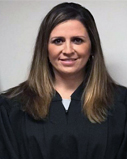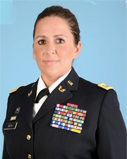
This Veterans Day, we are honoring those who have served. The following features Circuit Judge Sarah D. Smith of the Third Judicial Circuit and her thoughts on her military background, her accomplishments, and more.
Please briefly describe your military background since enlisting in the U.S. Army in 1995, to joining the Illinois Army National Guard. What is your current position/rank?

I enlisted in the Army at 17 to pay for college, I served as a light vehicle and power generator mechanic until I finished law school and then commissioned as a JAG Officer. In 2005, I was mobilized for 45 days to provide support for Hurricane Katrina where I was awarded a Humanitarian Service Award. I deployed to Kosovo for 11 months in 2007, and immediately thereafter spent 13 months in Afghanistan. While deployed in Afghanistan, I served as a volunteer firefighter for Camp Phoenix, conducted numerous humanitarian assistance missions, served as convoy commander as well other positions on mounted and dismounted security patrols throughout the country, and was selected to mentor and train the only female General in the Afghan National Army. I was the JAG assigned to respond to all Battle Drill X SIRs and assisted in the investigation and conducted the legal review of the deaths of 37 Servicemembers of Task Force Phoenix who were killed in combat during my tour. I traveled to 15 forward operating bases and 3 remote combat outposts in addition to participating in numerous day and night dismounted security patrols throughout the city of Kabul and surrounding areas. I planned and coordinated an additional 6 Humanitarian Assistance drops in villages surrounding Kabul and conducted over 25 joint combat mounted patrols through both friendly and hostile territory, serving in all vehicle crew positions, including convoy commander. For my service in Afghanistan, I was awarded the Bronze Star.
I spoke at the United Nations (UN) symposium on two occasions regarding my counterinsurgency operations in Afghanistan. Served as the legal advisor to the Dual Status Commander during the NATO Summit, held in Chicago, Illinois in 2012. Throughout my term as the State Judge Advocate for the ILARNG, I have consistently worked with Governor’s office as well as other civilian entities to broaden the ability for military sexual assault survivors to obtain State benefits and protections. In 2017 I drafted the 200+ page Manual for Courts Martial in response to the recent passage of the Illinois Code of Military Justice. In 2018, I was one of 3 members of the Illinois Army National Guard selected to attend the United States Army War College, and graduated Class of 2020 with a master’s degree in strategic studies. I am currently a Colonel, the highest-ranking female officer in the ILARNG and the State Judge Advocate.
What motivated you to join the military?
I was the first in my family to decide I wanted to go to college, so my parents said I needed to find a way to pay for it. I did not expect to make it a career, however as I look back at the last 30 years I can’t imagine a Sarah without the US Army. I have been a Soldier longer than I have been almost any other title besides daughter and sister, it is who I am.
When you reflect on your time in the military, what accomplishments and/or challenges stand out to you?
I think my greatest accomplishments are being the 1st Female Military Judge for the entire United States National Guard and the efforts I have made in advancing rights and protections for military sexual assault survivors, not only in the military but also in State legislation. And certainly, the greatest challenge I have is living my life in a way that would bring honor to the 37 Soldiers we lost in Afghanistan. I think about them every day, one in particular that I was closest to, SGT Simone A. Robinson. I wear her KIA bracelet on my wrist every day to remind me to never take our freedoms or this country for granted.
What led you to pursue law, and eventually become a judge?
I always had a strong sense of right and wrong and what I believed was fair or not fair, I was never afraid to speak my mind or to stand up for what I believed in, but I was lucky enough to know even at a very young age that I wanted to be an attorney and I did everything I could to make that happen. However, I never thought I would be at where I am today. Even after almost 10 years, I walk into the building and when security says, “Good Morning Judge” and I sometimes have to turn around to see who is behind me to realize that they are talking to me. Serving my community as a Judge has truly been such an honor and a privilege and there is no doubt in my mind that my military service was a key factor in my initial selection as an Associate Judge and my eventual election as a Circuit.
How do you think your time in the military influenced your legal career?
The Army Values (Loyalty, Duty, Respect, Selfless Service, Honor, Integrity, Personal Courage) are for lack of a better term beat into us from the time we are enlisted. I take those same values that I learned at 17 and apply them to everything I do. When I enlisted, I swore an oath to defend the Constitution of the United States, this is the same oath and loyalty that I pledged when I became a Judge. Being a Judge is such a sacred position for which I have a lot of reverence. Without our Constitution and all the rights and privileges it provides, and without Soldiers willing to give their life to defend it, we would not have the liberties we have in this country. I have seen first-hand countries and citizens who have suffered without those very freedoms that are important to me. So, I will do everything within my power to protect them. My colleagues often joke, “Don’t try and get out of Jury Duty with Judge Smith” and they are right - I lost 37 brothers and sisters for a citizen right to have their case presented by a jury of their peers, that is a sacred privilege we owe to our country, and it is something regular citizens can do to serve their country.
How do you celebrate Veterans Day, and what does it mean to you?
I used to go around and give speeches and walk in parades and events but lately it has become difficult for me and my husband (a 4x combat veteran) to do. It is hard to celebrate Veterans Day when you know there are 37 of your brothers and sisters who aren’t here with you to celebrate. So, for the past few years we put out our Service Flags and just spend time at home with our boys.
What would you like others to keep in mind when recognizing veterans?
That our country is still worth fighting for. Despite all its scars and faults, it is still worth all of the lives that have been lost, and all of the blood that has spilled to defend it. And to remember that most Veterans, especially those who have seen combat have had multiple tours, and especially those who served in Vietnam- they are broken. They may be good at holding it together, hiding it, or act like everything is fine, but deep down they are all broken. With the state of the country the way it is right now, the vitriol on social media, and the division within our own communities, if people really want to honor veterans, they should try to find more ways to unite this country than divide it.
Is there anything else you’d like to add?
I would like to emphasize the importance of our Veterans Treatment Courts. Many don’t realize that a lot of our Afghanistan and Iraqi veterans were Reservists. Unlike Active Duty, when these young men and women came home from their deployments they received 2 maybe 3 days of out-processing which generally consisted of hours long power point presentations about your benefits, a quick self-assessment with medical for which you were wise not to disclose any ailments for fear of being held up from seeing your family, and then just like that they are released back into their community to become citizens again. This is quite different from the Active Duty where Veterans go back to their Active Duty bases, surrounded by resources and other veterans who shared common experiences. So these 19-20 year old Soldiers are left dealing with the wounds of war, the atrocities they had to see and experience, and all the underlying trauma that comes from trying to assimilate back into a civilian. This is why we are seeing an influx of Soldiers with drug, alcohol, and domestic violence issues. I would highly encourage anyone working criminal or traffic dockets to begin their dockets with an inquiry if anyone has served in the US military (not if they are a Veteran), but if they have ever served in the US Military and then refer them to your VTC so they can get the treatment and services they desperately deserve.